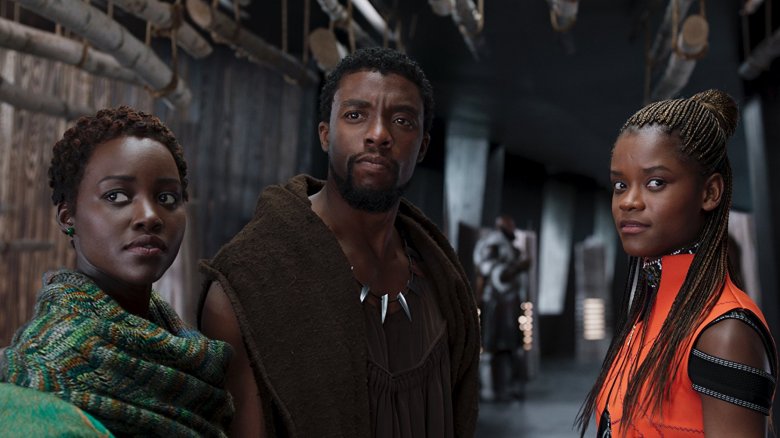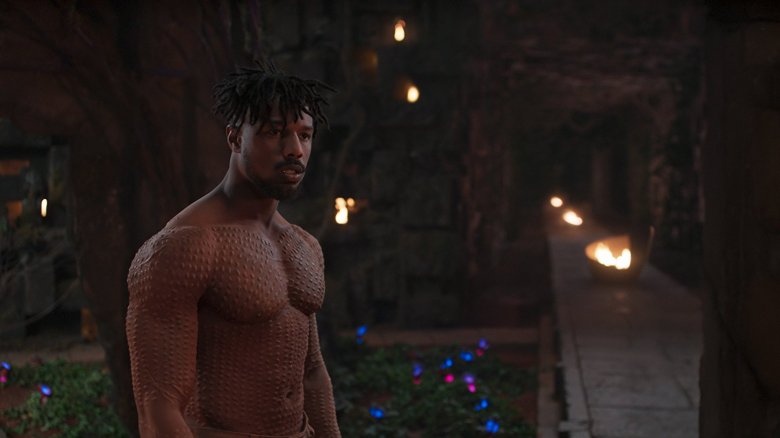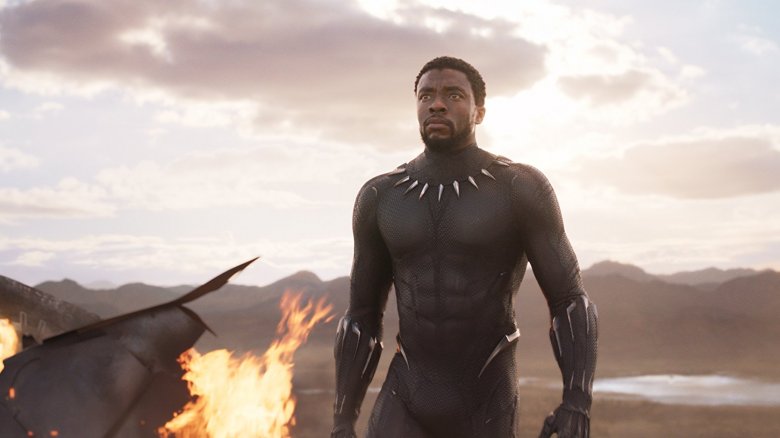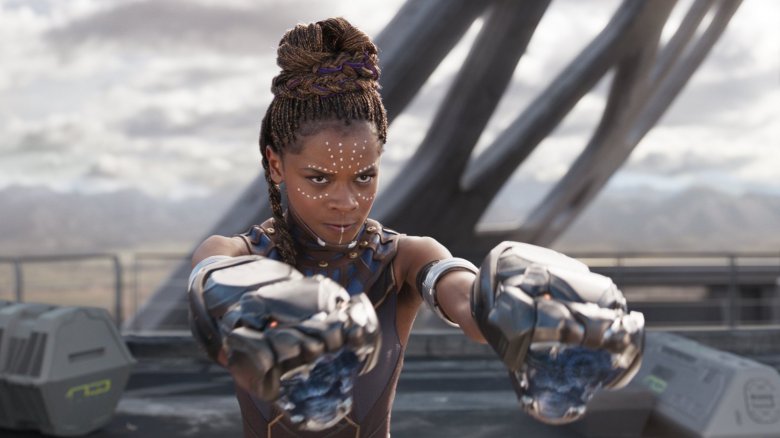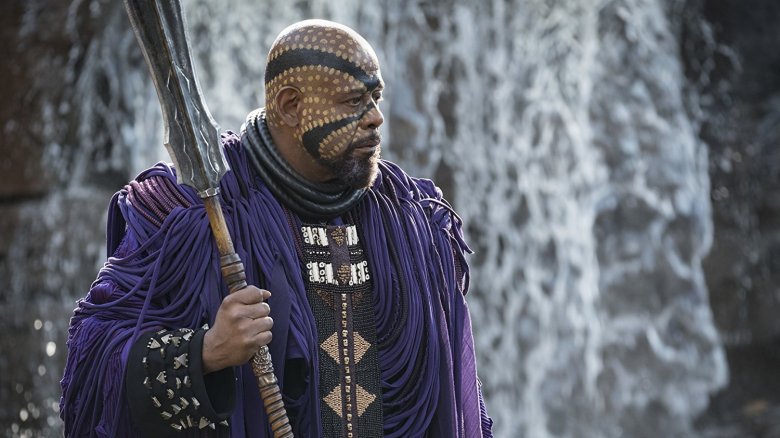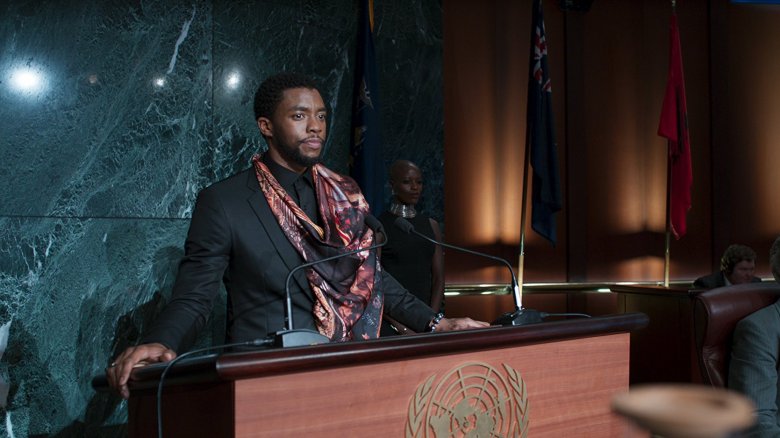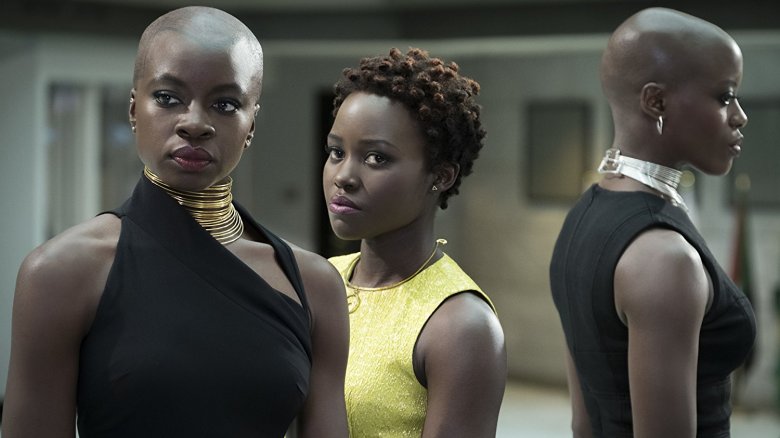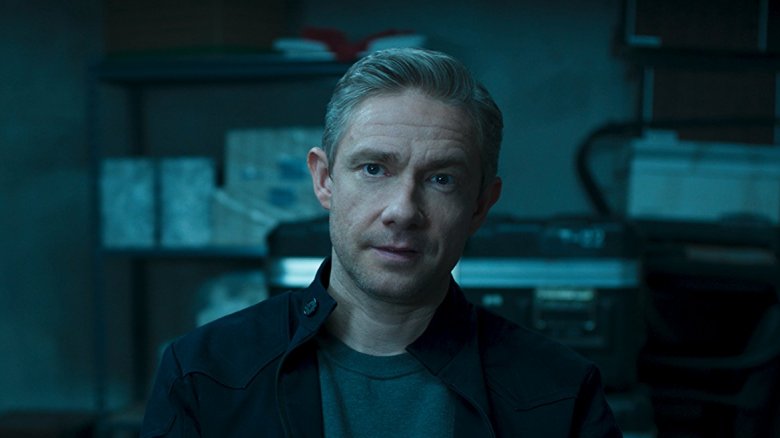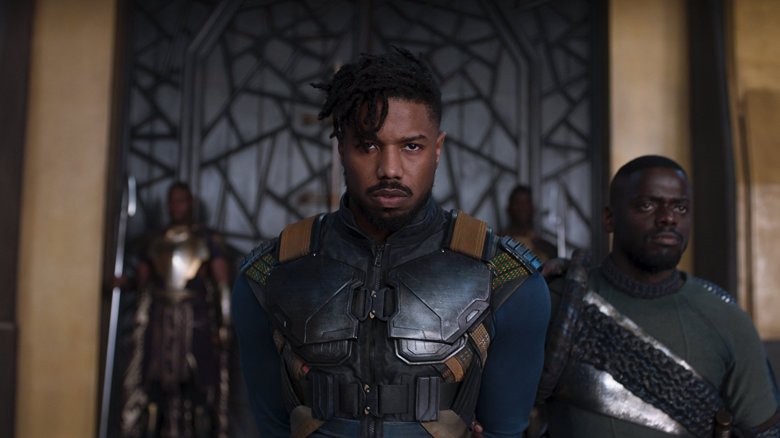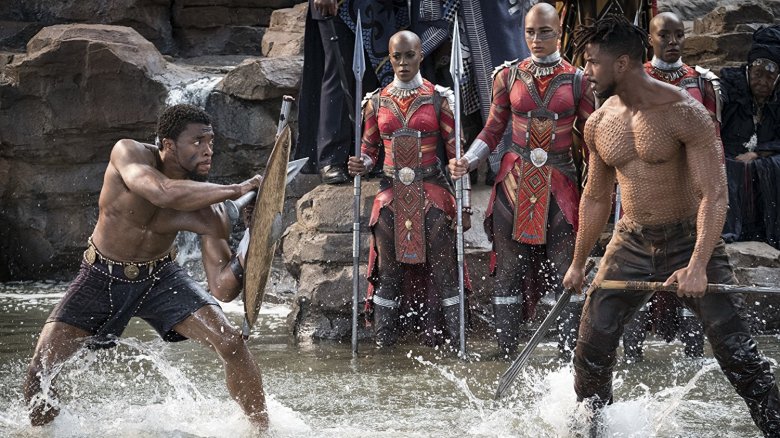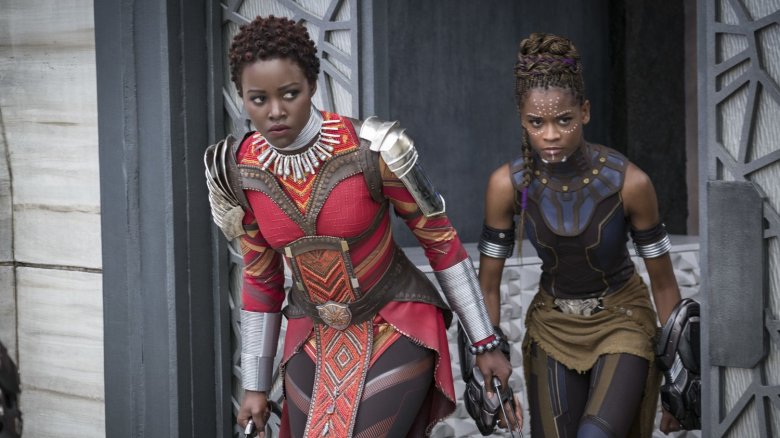Why Black Panther Blew Everyone Away At The Box Office
Black Panther doubled initial box office tracking numbers in its opening weekend, smashing early $100 to $120 million projections with a record-breaking $235 million four-day total. This is good for the second biggest Marvel opening weekend and the fifth biggest domestic opening weekend of all time. These numbers are even more impressive when you consider the fact that Black Panther opened in February, which is typically one of the slowest box office months of the year.
How did Black Panther manage to crush expectations and take over the cultural consciousness? While every Marvel movie can be expected to be a commercial juggernaut, Black Panther's success is nearly unprecedented, and could have a ripple effect throughout Hollywood. Here's how Black Panther blew everyone away at the box office.
Royal reviews
The entirety of the Marvel Cinematic Universe (with a few notable exceptions) has enjoyed widespread critical acclaim, and Black Panther is no different. The movie was showered with praise, building on the buzz generated by stellar early social media reactions with even better full reviews.
But even in the lofty context of the MCU, Black Panther managed to outpace its esteemed predecessors. The movie earned a 97 percent fresh rating on Rotten Tomatoes — not only an incredible score, but one high enough to beat out The Dark Knight and Iron Man (both at 94 percent) to nab the title of the highest rated live-action superhero film of all time. Being able to crown yourself one of the best-reviewed superhero movies ever is certainly no small feat, and while certain blockbusters are critic-proof, earning that stamp of approval definitely doesn't hurt.
Building buzz
Months before its release, Black Panther started building incredible word of mouth. The movie's teaser trailer scored 89 million views in the first 24 hours after its highly-promoted debut during Game 4 of the 2017 NBA Finals. This beat out the trailer views for Marvel's Captain America: Civil War (61 million) and Disney's Star Wars: The Force Awakens (55 million).
That buzz immediately spilled over onto social media, with the movie generating more mentions on Twitter than the NBA game during which it debuted. This continued throughout the lead-up to the film, and helped the movie earn second place on Fandango's survey of the most anticipated films of 2018 — after only Marvel's Avengers: Infinity War. Black Panther has since become the most-tweeted about movie of 2018 — a distinction it achieved even before it hit theaters.
All this word of mouth made sure Black Panther was saturated in the American consciousness. At the start of February, the movie had 88 percent total awareness, with 43 percent unaided awareness and a definite interest at 57 percent. Anticipation for the movie was so high that it beat out every other superhero movie in Fandango advanced ticket sales. In other words, even before it debuted, we knew Black Panther would blow everyone away at the box office.
Excited audiences
Black Panther continued to build on that buzz when it hit theaters, earning an A+ CinemaScore from opening night viewers — only the second Marvel movie to do so, after The Avengers. This strong word of mouth was reflected in the movie's Friday to Saturday drop, which was just 13.1 percent.
Audience anticipation for Black Panther was so strong that many viewers showed up to screenings in costumes inspired by the movie, and for many, their enthusiasm went even further, with viewers lining up to see the movie more than once. Fandango reported that the movie had a "significantly higher" number of repeat viewers than any other film during its opening weekend.
"It's not like anything we've ever experienced before, it has taken on its own life," said Dave Hollis, Disney's President of Theatrical Distribution. "The way people are talking about the experience is that, 'I saw it on Thursday, but I'm coming back on Saturday, and might be back on Tuesday.'" 61 percent of viewers polled by Fandango in the day's before the movie's release said that they were already considering repeat viewings before they had even seen the movie.
The #BlackPantherChallenge
The excitement moved off social media as well. Grassroots events have popped up across the United States surrounding the film, with activists using the movie as a way to bring their communities together. The movie also spurred the #BlackPantherChallenge, a campaign launched by philanthropist Frederick Joseph aimed at raising money to allow underprivileged children to see the movie for free.
Joseph initially wanted to raise $40,000 to help kids in Harlem see the film, but the challenge has since spiraled out even further, resulting in over $400,000 raised from a number of campaigns. Celebrities got in on the action as well, with J.J. Abrams, Chelsea Clinton, Viola Davis, and Ellen DeGeneres supporting the campaigns. Captain Marvel star Brie Larson has also helped encourage fans to buy tickets for those who can't afford them. The challenge brought more positive buzz and excitement to the film, while bringing the moviegoing community together in support of a good cause.
Big screen representation
A lot of the buzz surrounding Black Panther is thanks to its predominantly black cast, something rarely seen in big-screen blockbusters. (A study from USC's Annenberg School of Journalism and Communication found that about a quarter of the top 100 highest grossing films of 2016 had no black characters.)
Black Panther marks the first time a black superhero is leading a movie in the modern MCU, and it's also an important milestone behind the camera, with Ryan Coogler becoming the first black director of a Marvel movie. This was reflected in the movie's audience — according to comScore, 37 percent of the opening weekend audience for the movie was African-American, compared to an average of 15 percent for other superhero films.
"Our goal is to make movies that reflect the diversity of our world because those are the stories that resonate everywhere," said Hollis. "To have the ability to show other people's experience is part of the beauty of movies, but it also allows for rich storytelling, and for the people whose experiences are up on the screen, especially if they have not been showcased a ton."
"The meaningful nature of being able to see yourself represented, those things really matter to everyone, but in this case it matters even more to communities of color," he continued. "Representation matters and the times we've leaned into it, we've had massive results."
#WhatBlackPantherMeansToMe
Black Panther has a special place in the hearts of many viewers, and they took to social media with the hashtag #WhatBlackPantherMeansToMe to express their enthusiasm about the movie. The hashtag was created by Kayla Sutton, the director of online marketing for Black Girl Nerds, and was inspired by her 8-year-old son.
"It means that my kids and young black kids everywhere will see themselves as heroes capable of leading their own narratives," wrote Twitter user Matthee A. Cherry using the hashtag. "Everything," added Twitter user Chelsea. "I cried when it was announced. I cried at the visuals. I cried at the #SDCC Marvel booth. I cried in joy. Their blackness is mine. My blackness is theirs. Black Panther is a love letter, a celebration, and a victory march for the diaspora." The outpouring on social media helped to build even more buzz for the movie, and helped solidify its place as a cultural milestone.
Strong female characters
Black Panther also received a lot of praise for its strong female characters, led by Lupita Nyong'o's Nakia, Danai Gurira's Okoye, Letitia Wright's Shuri, and Angela Bassett's Ramonda. As was the case with the 2017 box office hit Wonder Woman, female audiences turned out in full force to support these powerful ladies — 45 percent of the opening weekend viewers were women, compared to 35 to 40 percent for most superhero movies.
The movie's badass women also got a lot of attention on social media, with one tweet calling Shuri "the Disney Princess I've been waiting my whole life for." "Being able to see women and girls like myself designing the most advanced technology and weapons the world has [ever] seen," wrote Twitter user Netia McCray.
An important place in the MCU
Warning: This entry contains spoilers for the Black Panther post-credits scenes.
Two years before Black Panther was released, Marvel Studios head Kevin Feige started to tease how important the film would be in setting up Marvel's massive superhero team-up flick Avengers: Infinity War. "T'Challa's story is very important to us as it links to the next Avengers films, which is why we brought it forward," he said in explaining why the movie's release date was moved up before Infinity War.
The Black Panther post-credits scenes make it clear how important the movie is in the building of the MCU. T'Challa (Chadwick Boseman) finally bringing Wakanda out of hiding could bring impressive technological innovations to the rest of the world, and possibly to some of the MCU's other heroes as well. Then there is, of course, the tease of Sebastian Stan's Bucky Barnes, who, if the trailers are any indication, will be featured prominently in Infinity War. While Black Panther is definitely a standalone, its connection to the larger MCU was still strong enough to generate additional excitement from Marvel fans.
A massive marketing campaign
In addition to the impressive grassroots marketing efforts for Black Panther, Marvel also launched a huge traditional marketing campaign for the movie. This kicked off with a merchandising campaign that started almost two years before the movie was released, including a Hasbro toy line, LEGO construction sets, and a new comic from Ta-Nehisi Coates.
Marvel really started ramping up marketing in the summer of 2017, releasing the first teaser trailer during Game 4 of the NBA Finals and then teasing some very buzzy new footage at Marvel's San Diego Comic-Con panel. The marketing also included a lot of buzzy TV spots and further trailers. Marvel even partnered with Lexus for a tie-in commercial that aired during the Super Bowl, and the movie also featured an impressive soundtrack executive produced by Kendrick Lamar, which debuted at No. 1 on the Billboard 200.
Throughout the marketing campaign, the movie continued to receive a lot of attention for its diverse representation, with even toy commercials getting honored for showing a side of America that Hollywood often ignores. Combining an impressive marketing campaign with the movie's already existing buzz sent it right to the top of the box office.
No major challengers
Most Marvel movies don't face huge competition — other studios avoid scheduling other projects around their opening weekends. This was the case for Black Panther, which easily defeated the weekend's other wide releases, Early Man and Samson, both of which underperformed with totals below $4 million.
Black Panther did have to face off against a big franchise carryover from Valentine's Day weekend – Fifty Shades Freed, the final film in the Fifty Shades trilogy. However, Fifty Shades movies have traditionally experienced steep second-week drops, and Freed was no different, falling 49.6 percent to third place for the four-day weekend.
The rest of the top 10 was filled out with more holdouts, many of which have already been in theaters for at least a few weeks. Although Black Panther was always going to be able to crush the box office competition, the fact that no other major films hit theaters during its opening weekend really helped the movie blow away the competition.
The opportunity for strong legs
Black Panther shouldn't lose its top spot at the box office anytime soon. After its massive opening weekend, the movie doesn't face any major competition for the next few weeks and could stay at No. 1 through March 9, when Ava DuVernay's A Wrinkle in Time hits theaters. A Wrinkle in Time, which also has a black director and a black lead, projected in very early tracking to open around $52 million.
In its second weekend, Black Panther will face two major new releases, but neither appear able to beat its projected grosses of around $100 million — and that's even if it experiences an incredibly steep drop. (Which, with the movie's stellar word of mouth, it likely won't.) The Jason Bateman comedy Game Night is projected to open to $15 to $20 million, while the Natalie Portman sci-fi flick Annihilation is projected to open around $12 to $15 million.
Early tracking for Panther's third weekend in theaters also suggests that the movie should come out on top. It'll be facing off against Bruce Willis' Death Wish remake, which is projecting $13.5 million, and Jennifer Lawrence's Red Sparrow, which is projected for $26 million. Should Black Panther follow a similar path to The Avengers, the movie should still bring in around $50 million in its third week. The opportunity for the film to leg out should keep enthusiasm high and push the movie into becoming one of Marvel's top earners.
